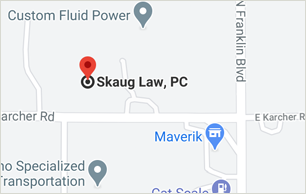Good Samaritan – It’s a sign of character but it’s also the law
Last updated Monday, May 16th, 2022

Oregon Good Samaritan Law – What is it? Where does it happen and how does it affect us here in Idaho?
Being good neighbors leans us into supporting clients both in Oregon and here at home in Idaho as good Samaritans.
According to the National Center for Biotechnology Information (NCBI), The premise underlying the good Samaritan law traces its origin to the ancient biblical parable, ultimately yielding the definition of a good Samaritan as an individual who intervenes to assist another individual without prior notion or responsibility or promise of compensation.
Good Samaritan laws have their basis on the idea that consensus agreement favors good “public policy” to limit liability for those who voluntarily perform care and rescue in emergency situations. It is well known that medical emergencies outside of the umbrella “medical setting” or “clinical environment” are common. So in theory and principle, we are improved as a society if the potential rescuers (i.e., the good Samaritans) are solely concerned about helping a person in need as opposed to worrying about the possible liability associated with assisting their fellow man or woman.
On July 1, 2020 The Iowa Legislature updated our Good Samaritan Law to includes the following provision:
“IMMUNITY OF PERSONS GIVING EMERGENCY FIRST AID FROM DAMAGE CLAIM. That no action shall lie or be maintained for civil damages in any court of this state against any person or persons, or group of persons, who in good faith and without compensation, being at, or stopping at the scene of an accident or emergency, offers and administers emergency first aid or emergency medical attention to any person or persons injured in such accident or emergency unless it can be shown that the person or persons offering or administering emergency first aid or emergency medical attention, is guilty of gross negligence in the care or treatment of said injured person or persons or has treated them in a grossly negligent manner. The immunity described herein shall cease upon delivery of the injured person to either a generally recognized hospital for treatment of ill or injured persons, or upon assumption of treatment in the office or facility of any person undertaking to treat said injured person or persons, or upon delivery of said injured person or persons into the custody of an ambulance attendant.”
Being good neighbors, as we are with with the State of Oregon, our Good Samaritan Laws cross borders between our two states, below is the law as it applies in Oregon:
“Oregon Revised Statute (ORS) 30.800 enacted 1985”
Liability for emergency medical assistance by medically trained persons.
Have You Been Injured at Work?
Get Your Free Injury Case Review
An experienced workers’ compensation attorney knows what needs to be done. The minute you sign with Skaug Law – we start working.
1) As used in this section:
a) “Emergency medical assistance” means:
A) Medical or dental care not provided in a place where emergency medical or dental care is regularly available, including but not limited to a hospital, industrial first-aid station or a physician’s or dentist’s office, given voluntarily and without the expectation of compensation to an injured person who is in need of immediate medical or dental care and under emergency circumstances that suggest that the giving of assistance is the only alternative to death or serious physical aftereffects; or
B) Medical care provided voluntarily in good faith and without expectation of compensation by a physician licensed by the Board of Medical Examiners for the State of Oregon in the physician’s professional capacity as a team physician at a public or private school or college athletic event or as a volunteer physician at other athletic events.
b) “Medically trained person” means:
A) A person licensed under any law of a state or of the United States to practice medicine and surgery, dentistry or dental surgery, professional nursing, osteopathy, naturopathy or chiropractic;
B) A person who has completed successfully, within three years prior to the date on which emergency medical assistance is rendered by the person, a state or federal-sponsored training program for persons engaging in the rendering of emergency medical assistance or who has completed successfully the aforesaid training program and, within three years prior to the date on which emergency medical assistance is rendered by the person, regularly has engaged in the rendering of emergency medical assistance, and who possesses proof of the successful completion of such a training program;
C) A person who has completed, within three years prior to the date on which emergency medical assistance is rendered by the person, a course sponsored or approved by the American Red Cross, the federal Mine Safety and Health Administration, the Occupational Safety and Health Administration or the Oregon Accident Prevention Division of the Workers’ Compensation Department, is qualified to render emergency first-aid and possesses proof of the completion of such first-aid training;
D) A person who, within three years prior to the date on which emergency medical assistance is rendered by the person, has been trained or who has been trained, and within three years prior to the date on which emergency medical assistance is rendered by the person, has served as a medical assistant or medical corpman [sic] in the Armed Services of the United States;
E) A person who possesses an emergency medical technician I certificate issued pursuant to
ORS823.150 or and emergency medical technician II, III, or IV certificate issued pursuant to ORS677.610 to 677.700; or
F) A person who has completed, within one year prior to the date the emergency cardiopulmonary resuscitation is rendered by the person, a course sponsored by the American Red Cross or the American Heart Association in emergency cardiopulmonary resuscitation, or a course in emergency cardiopulmonary resuscitation provided by an agency or organization that meets the current criteria and standards of emergency cardiopulmonary resuscitation training as established by the American Heart Association and is qualified to render cardiopulmonary resuscitation and who possesses proof of the completion of such a training program.
2) No person may maintain an action for damages for injury, death or loss that results from acts or omissions of the medically trained person while rendering emergency medical assistance unless it is alleged and proved by the complaining party that the acts or omissions violate the standards of reasonable care under the circumstances in which the emergency medical assistance was rendered, if the action is against:
a) A medically trained person; or
b) A governmental agency or other entity which employs, trains, supervises or sponsors the medically trained person.
3) The giving of emergency medical assistance by a medically trained person does not, of itself, establish the relationship of physician and patient, dentist and patient or nurse and patient between the medically trained person giving the assistance and the person receiving the assistance insofar as the relationship carries with it a duty of a physician, dentist or nurse to provide or arrange for further medical care for the injured person after the giving of emergency medical assistance.
[1967 c.266 $$1, 2; 1973 c.635 $1; 1979 c576 $1; 1979 c.731 $1; 1983 c.779 $1; 1985 c.428 $1]
https://www.redcrosslearningcenter.org/s/
Good Samaritan laws are designed to protect most professional rescuers from the risk of legal action as long as they act in good faith, within the scope of their training and are not negligent.
1) The vast majority of states and the District of Columbia have Good Samaritan laws.
2) Good Samaritan laws protect people who willingly provide emergency care without accepting anything in return.
3) Good Samaritan laws may not protect people from legal liability resulting from a victim’s injury if they provide care outside of their level of training.
4) Good Samaritan laws may not protect a rescuer from legal liability resulting from a victim’s injury if the rescuer stopped providing care and left the scene of the emergency before another rescuer of equal or more advanced training arrived to take over.

